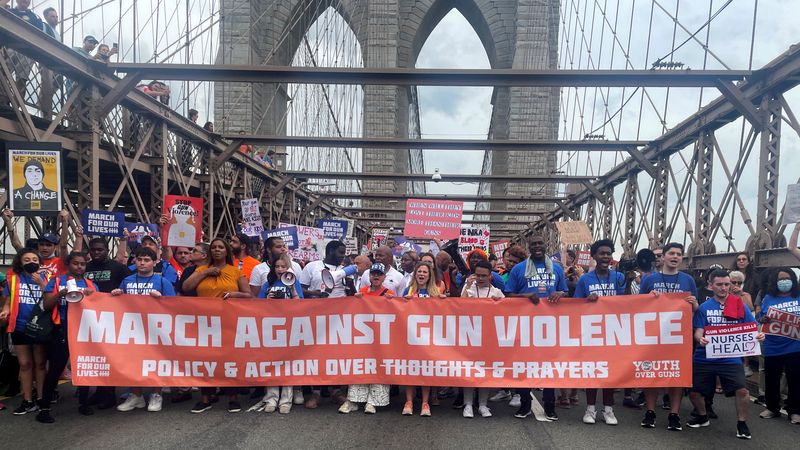New York braces for more guns after landmark Supreme Court ruling
2022.06.23 23:11
2/2

FILE PHOTO: People cross the Brooklyn Bridge as they attend “March for Our Lives” rally, one of a series of nationwide protests against gun violence, New York City, U.S., June 11, 2022. REUTERS/Eric Cox
2/2
NEW YORK (Reuters) – The mayor of New York City and New York’s governor voiced alarm on Thursday after the U.S. Supreme Court struck down the state’s restrictions on carrying concealed handguns in public, saying more people will now be toting firearms and everyone will be less safe.
Mayor Eric Adams, a Democrat and a former police captain, predicted that more disputes would boil over into violence once it becomes easier to carry a gun around the city of more than 8 million people, the nation’s most populous.
“This decision has made every single one of us less safe from gun violence,” Adams said at a City Hall news conference. “The decision ignores the shocking crisis of gun violence every day engulfing not only New York but engulfing our entire country.”
So far this year, 693 people have been shot in New York City, according to official statistics that include both fatal and non-fatal shootings, down about 9% from the 765 in the same period last year.
Mass shootings have become recurrent in the United States, including one on May 14 at a grocery store in Buffalo, New York, that left 10 Black people dead. An avowed white supremacist was charged with murder and domestic terrorism motivated by hate.
The Supreme Court for the first time ruled that the U.S. Constitution’s Second Amendment, which protects the right to “keep and bear Arms” and was ratified in 1791, secured an individual right to carry weapons in public for self-defense.
The court’s conservative majority ruled that New York state’s system for issuing concealed-carry permits only to people who could prove they had “proper cause” was unconstitutional.
New York Governor Kathy Hochul, who decried the ruling as “very disturbing,” said the state will pursue new gun-licensing policies conforming with the ruling.
“Shocking,” Hochul, a Democrat, said at a news conference. “Absolutely shocking that they have taken away our right to have reasonable restrictions.”
Hochul said her office would work with the Democratic-controlled state legislature to pass new measures including defining “sensitive places” where guns would be barred.
Paige Graves, the New York transit system’s general counsel, said the Metropolitan Transportation Authority has begun drafting “appropriate rules to keep dangerous weapons out of our subways, buses and commuter trains.”
Hochul proposed changes to the state’s permitting process that would create a “higher threshold” for concealed-carry permits and require firearms training. She said she wants guns not to be allowed on the premises of private businesses unless the business owner explicitly decides otherwise.
Her office said that as of Thursday New Yorkers still needed to apply for a concealed-carry license, but more will likely be granted because an applicant no longer must provide a specific justification for wanting a gun for self-defense.
Major public defenders groups in New York City filed a brief with the Supreme Court last year in support of the gun-rights plaintiffs in the case.
The public defenders said they represented many clients, particularly Black and Latino New Yorkers, who were otherwise law-abiding but had faced prosecution for getting a gun for self-defense or were unfairly denied a license.
“This decision may be an affirmative step toward ending arbitrary licensing standards that have inhibited lawful Black and Brown gun ownership in New York,” the Legal Aid Society said in a statement.








